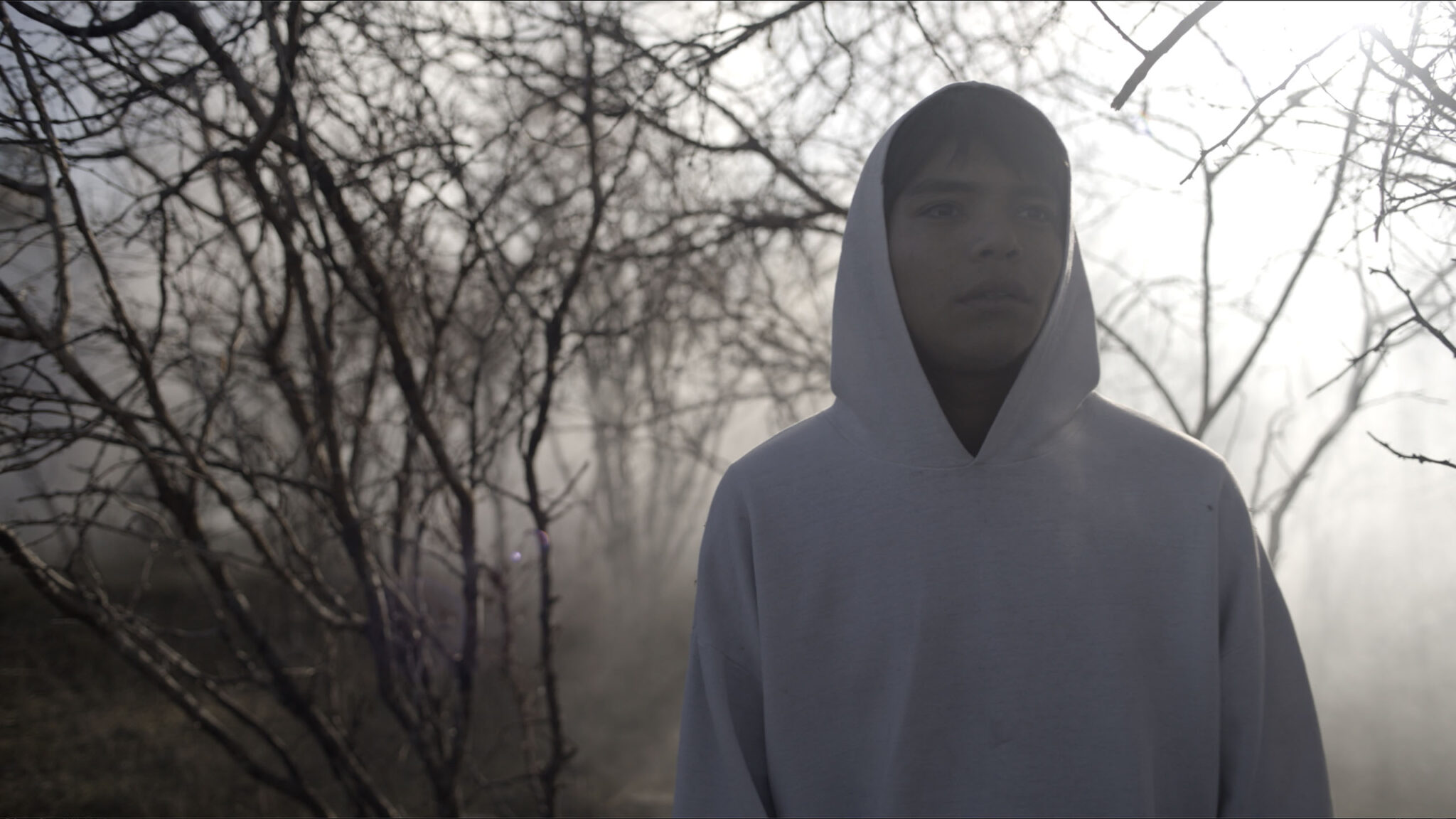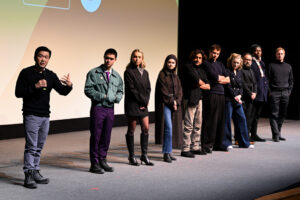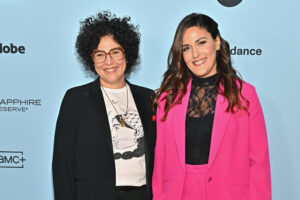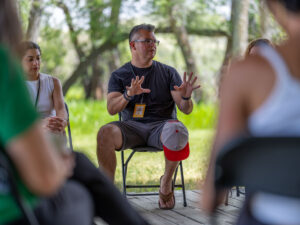By Jessica Herndon
One of the most exciting things about the Sundance Film Festival is having a front-row seat for the bright future of independent filmmaking. While we can learn a lot about the filmmakers from the 2024 Sundance Film Festival through the art that these storytellers share with us, there’s always more we can learn about them as people. This year, we decided to get to the bottom of those artistic wells with our ongoing series: Give Me the Backstory!
“Sujo is a love letter for young people in trouble in Mexico,” says Astrid Rondero of the stunning drama she co-directed and co-wrote with Fernanda Valadez. Equally tumultuous and sensitive, the film follows Sujo, a boy who becomes an orphan in Mexico at the age of 4 when his father, a cartel gunman, is killed. After his aunt takes him in and moves to the countryside, he must decide if he will continue to be haunted by his father’s past and follow in his footsteps or forge his own path.
“Sujo is a coming-of-age story of a boy turning into a man in a very harsh reality,” says Rondero of the feature, which won the World Cinema Grand Jury Prize: Dramatic at the 2024 Sundance Film Festival. “Despite being set in a specific context, we wanted Sujo to be about growing up, having a very conflictive father figure, and coming to terms with who you are. We believe we can all relate in one way or another to that experience.”
The 2024 Sundance Film Festival isn’t the first time Rondero and Valadez have worked on a Fest premiere that powerfully portrays the complexities of life in Mexico. Identifying Features (Sin Señas Particulares), which Valadez directed and co-wrote with Rondero, debuted at the 2020 Festival, where it won the audience award and a special jury award for best screenplay in the World Cinema Dramatic Competition. “We were very fortunate that Identifying Features (Sin Señas Particulares) premiered at [the 2020 Sundance Film Festival] and received two awards,” says Rondero, who has been collaborating with Valadez for 15 years. “Returning to Sundance with Sujo feels like completing a cycle — a very happy one.”
Below Rondero and Valadez discuss their filmmaking origins, how they came to name their film and its titular character, and being confronted with disheartening changes in the beloved state in Mexico where they filmed Sujo.

What was the biggest inspiration behind Sujo?
Rondero: When we were working on our previous film Identifying Features, we came across a particular book of chronicles called Levantones (Taken) written by the great Mexican journalist Javier Valdez, himself later a victim of violence. It wasn’t a story in particular that caught our attention, but an atmosphere that he managed to share with deep humanity and utmost respect: real accounts of both victims and perpetrators, women, men, and children, all caught for one reason or the other in the drug cartel violence that runs rampant in Mexico.
We wondered how many orphans this crisis has left in our country, and how many of those orphans are the children of the people who actively participated in acts of violence. We wondered, What is their inheritance, and what awaits them? And more importantly, What would it take for a young man to challenge this reality?
Deep within, there’s also the inspiration of Jude the Obscure by Thomas Hardy, which is one of [my] most beloved books. The stories of orphans in turbulent times are a way to see ourselves finding understanding under the most hopeful light. The name Sujo comes from a Mongolian legend that Fernanda read as a child, a story of friendship between a boy and a horse. So, as is usual with us, the project was born of an encounter of ideas, memories, and things we love.
All of it led us to Sujo, a story of an orphan growing up in a Mexico stricken by drug violence, poverty, and high hopes — a tale of a young man fighting against repetition and finding his real self.
Films are lasting artistic legacies, what do you want Sujo to say?
Rondero: That our lives and times are important and there’s always beauty in what we experience and feel, no matter how complex our times or our lives are. Films are an opportunity to see deeper into ourselves and the world we live in — and the treasures we find in each film are ours to keep.
Why does this story need to be told now?
Rondero: There is a staggering number of victims of cartel-related violence in Mexico. Before 2019, there were almost 40,000 children orphaned by this violence, but this number grew to approximately 90,000 in the span of only four years. There’s another number that says a lot about the crisis that our country is going through: Up to 460,000 children and teenagers have been recruited by the drug cartels.
So, children and teenagers in our country are very vulnerable and at risk. It’s like young people are being used as fuel to keep the machinery of the cartels going. They are used and discarded. And that’s one of the great challenges of our times in Mexico: What can we do as a society to offer our youth something more than live fast, die young? How can we think about this crisis beyond an easy opposition between good and evil? We know a film can’t give answers to a social crisis, but through the story of one orphan, we wanted to imagine a scenario in which a young man could break the cycle of violence.
How do you want people to feel after they see Sujo?
Rondero: Sad but hopeful, with the certainty that we all can change our lives. And that a little goes a long way — a small act of kindness can change somebody else’s life.
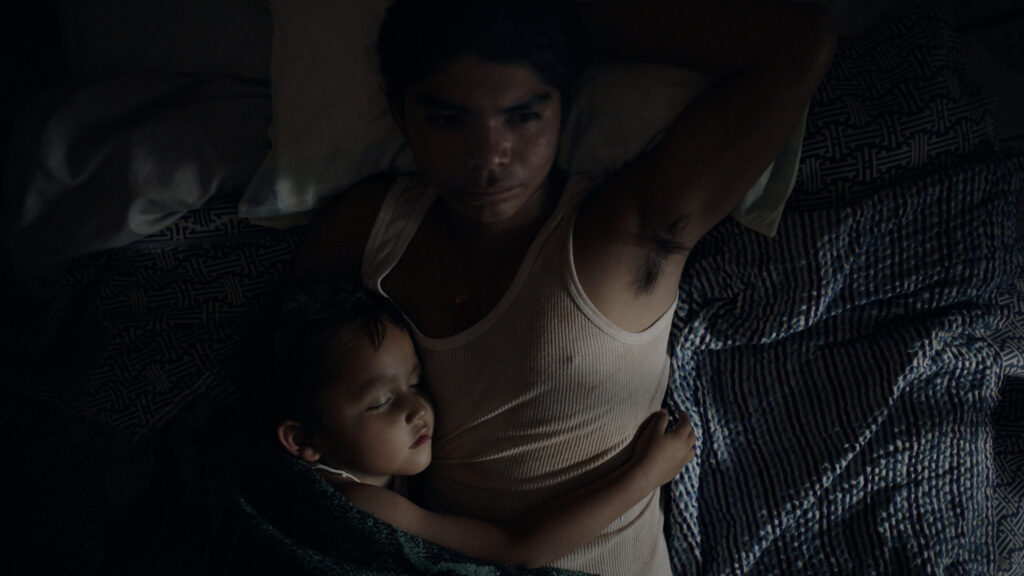
Tell us an anecdote about casting or working with your actors.
Rondero: During the casting process, we met a lot of children. Two of them stood out as options for young Sujo. They were both very little, both barely 4 years old. We didn’t agree on which boy to cast, so we asked the Director of Photography and our longtime friend, Ximena Amann, to vote for one. She sided with Fernanda. So, the second boy was cast as little Jai. We completed the cast, worked/played a lot with the children, and prepared for production.
[Then,] the first day of shooting arrived. The first shot of the film was little Jai, little Jeremy, and Rosalía going to school. Everything went great. Then it was the turn of the boy who was cast as Sujo to wave them goodbye. And there and then, despite a lot of previous work and games, he decided he didn’t want to play with us anymore. We couldn’t even make one shot with him. So, my favorite, the other boy, became young Sujo. It was meant to be. It is not noticeable, but in that scene, the same child is Jai and also Sujo. He waves goodbye to himself.
What was your favorite part of making the film? Memories from the process?
Rondero: There were some wonderful scenes with the kids. It was challenging but really exciting to see them going along with fiction and, at the same time, just being themselves. The actresses Yadira Perez (Nemesia) and Karla Garrido (Rosalia) were wonderful and generous, and we believe their kindness and love made a lasting impression on the kids, who kept calling them “mom” or “aunt” outside of the set.
The production had to be split into two parts, so the last one was Mexico City. Some months passed, and we prepared a lot and storyboarded all the frames. But in the end, it was as if the film happened by itself. Don’t know why, but we felt a powerful feeling, as if we were really witnessing Sujo’s life and struggles.
The editing was very exciting. Sujo is the fifth project we have edited with our mentor, friend, and editor Susan Korda. (In many ways, Susan, one of the characters of this film, is based on her.) Sometimes we feel we make films to get to the editing process and share them with Susi. For us, editing is a very creative and wonderful phase of filmmaking. We even quarreled a little over whose turn it was to edit.
What was a big challenge you faced while making this film?
Rondero: Sujo has definitely been our most challenging film. There were many locations, many actors, very young children, and a lengthy script. But probably the most challenging part was coming to terms [with the fact] that our beloved Guanajuato, a state that has always supported our films in the most generous way, has become dangerous. We had an encounter with armed men that fortunately didn’t have serious consequences, but the innocence and freedom with which we used to move in rural Guanajuato is now gone.
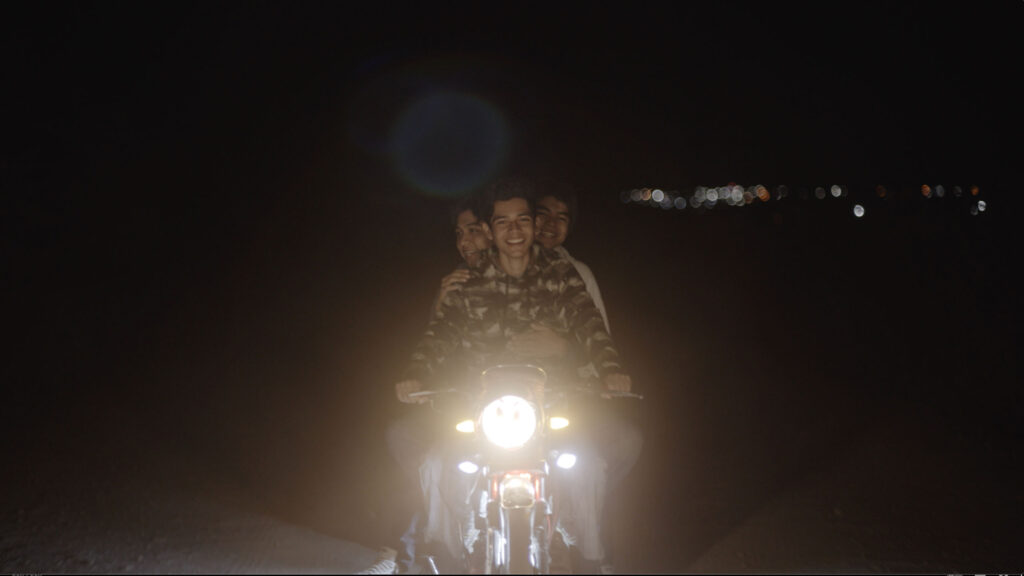
Tell us why and how you got into filmmaking.
Rondero: My grandfather was a cinephile and I became enamored with cinema at a very early age. I knew all I wanted was to make films. I was young when I got into film school (ENAC- UNAM) and I was very lucky that the process of filmmaking was as exciting for me as watching films, which is not always the case.
Valadez: It took me longer to decide I wanted to be a filmmaker. I’ve loved films for as long as I can remember, but probably because there were no movie theaters in my hometown when I was growing up, I felt filmmaking was beyond my reach — like a fantasy. When I moved to Mexico City when I was in my twenties, my desire to become a filmmaker became possible.
We met while we were students and we have been collaborating for 15 years, producing for each other and co-writing, but Sujo is the first project we’ve made as co-directors. When we premiered our previous film, Identifying Features, at Sundance 2020 (co-written by the both of us, directed by [me], and produced by Astrid), an executive of a distribution company told us that by talking to us, she got the feeling that we really were both authors of that film and she’d like to release it in the U.S., naming us both as authors. It made a lot of sense. Sujo was meant to be Astrid’s second feature as a director, and after that realization, she invited [me] to co-direct. Our creative process has always felt like a conversation that goes from one film to the other; a collaboration that comes as second nature. So, Sujo is a conversation that Astrid opened and [I] joined.
What is something that all filmmakers should keep in mind in order to become better cinematic storytellers?
Rondero: That probably can only be answered individually. For us, the challenge is now to maintain and grow our careers artistically. And even if the word sounds strange, spiritually too. Filmmaking is a very passionate and exciting way of living, but it is also stressful and uncertain. It’s an incredible adventure, and at the same time, a perilous path that can exalt your insecurities and your character flaws. So, the challenge is to cultivate the curiosity, the passion, the empathy, and the playfulness that brought us to this life from the beginning.
Tell us about your history with Sundance Institute. When was the first time you engaged with us? Why did you want your film to premiere with us?
Rondero: In 2019, I was writing the first draft of Sujo and was invited to the Morelia | Sundance Institute Story Lab. The project benefited a lot from that experience. Almost in parallel in the autumn of 2019, our previous film, Identifying Features, was screened as a work in progress at the San Sebastián International Film Festival and was invited to apply to Sundance by one of the programmers. We were very fortunate that Identifying Features premiered at Sundance 2020 and received two awards.




